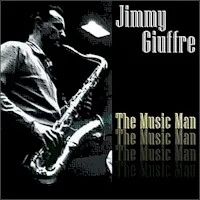Year: 1956
File: MP3@320K/s
Time: 60:34
Size: 141,4 MB
Art: Front
(3:29) 1. The Blindfold Test No. 1
(3:42) 2. Culver City
(2:54) 3. Van Nuys Indeed
(3:56) 4. Burbank Bounce
(4:47) 5. Santa Monica
(4:07) 6. The Blindfold Test No. 2
(4:03) 7. Here's Pete
(3:59) 8. No Love, No Nothin'
(3:17) 9. I'm Getting Sentimental Over You
(2:42) 10. Come Love
(2:55) 11. T.N.T.
(3:31) 12. Thank You, Judge
(4:32) 13. Santa Anita
(3:34) 14. Hooray For Hollywood
(4:30) 15. The Blindfold Test No. 3
(4:27) 16. Arcadia
Best-known as the trumpet section leader in Doc Severinsen's Tonight Show Band, Conte Candoli was a fine all-around jazz stylist most at home in the worlds of bop and West Coast cool jazz. Younger by four years than his similarly accomplished trumpet-playing brother Pete, Conte was born Secondo Candoli in Mishawaka, IN, on July 12, 1927. He first patterned himself after players like Harry James, Roy Eldridge, and Dizzy Gillespie, later discovering Miles Davis and Clifford Brown.
His first job came at age 16, when brother Pete recommended him for a summer gig with Woody Herman's Thundering Herd; after graduating high school, he joined full-time. He went on to play with several other bands, including Stan Kenton, whom he left in 1954 to form his own band. After leading some recording dates, he soon found a more comfortable existence, moving to Los Angeles and taking session jobs in between gigs with Howard Rumsey's Lighthouse All-Stars.
After about four years, he left in 1960 to work with drummer Shelly Manne, while he and Pete both enjoyed top-dog status in the L.A. session community. In 1968, Candoli took a part-time gig with the Tonight Show Band and joined permanently in 1972, when the show officially moved to Burbank.
During the '70s, he was also a member of Supersax, among other L.A. all-star outfits, and also continued his periodic collaborations with his brother. Candoli retired from the Tonight Show along with Johnny Carson in 1992, and continued to play until a battle with cancer slowed his activities. Candoli died in a convalescent home on December 14, 2001.By Steve Huey https://www.allmusic.com/artist/conte-candoli-mn0000100990/biography
Personnel: Conte Candoli / trumpet; John Graas / flute; Charlie Mariano / alto sax; Marty Paich / piano; Monty Budwig / bass; Stan Levey / drums; Buddy Collette / alto sax, flute; Jimmy Giuffre / clarinet, tenor sax,bass sax; Gerald Wiggins / piano; Howard Roberts / guitar; Curtis Counce / bass; Hank Jones / piano; Barry Galbraith / guitar; Milt Hinton / bass; Osie Johnson / drums; Harry Edison / trumpet; Herb Geller / alto sax; Bob Enevoldsen / valve trombone, tenor sax; Lorraine Geller / piano; Joe Mondragon / bass
His first job came at age 16, when brother Pete recommended him for a summer gig with Woody Herman's Thundering Herd; after graduating high school, he joined full-time. He went on to play with several other bands, including Stan Kenton, whom he left in 1954 to form his own band. After leading some recording dates, he soon found a more comfortable existence, moving to Los Angeles and taking session jobs in between gigs with Howard Rumsey's Lighthouse All-Stars.
After about four years, he left in 1960 to work with drummer Shelly Manne, while he and Pete both enjoyed top-dog status in the L.A. session community. In 1968, Candoli took a part-time gig with the Tonight Show Band and joined permanently in 1972, when the show officially moved to Burbank.
During the '70s, he was also a member of Supersax, among other L.A. all-star outfits, and also continued his periodic collaborations with his brother. Candoli retired from the Tonight Show along with Johnny Carson in 1992, and continued to play until a battle with cancer slowed his activities. Candoli died in a convalescent home on December 14, 2001.By Steve Huey https://www.allmusic.com/artist/conte-candoli-mn0000100990/biography
Personnel: Conte Candoli / trumpet; John Graas / flute; Charlie Mariano / alto sax; Marty Paich / piano; Monty Budwig / bass; Stan Levey / drums; Buddy Collette / alto sax, flute; Jimmy Giuffre / clarinet, tenor sax,bass sax; Gerald Wiggins / piano; Howard Roberts / guitar; Curtis Counce / bass; Hank Jones / piano; Barry Galbraith / guitar; Milt Hinton / bass; Osie Johnson / drums; Harry Edison / trumpet; Herb Geller / alto sax; Bob Enevoldsen / valve trombone, tenor sax; Lorraine Geller / piano; Joe Mondragon / bass
Modern Sounds From The West




















